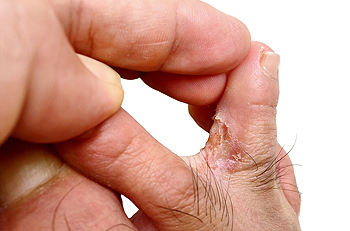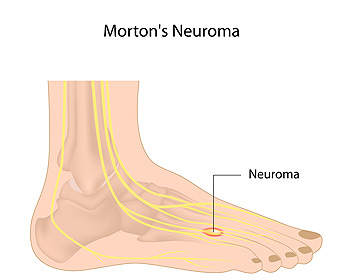
 Corns can form on the tops or sides of the toes. They develop as a result of friction that can be caused by wearing shoes or socks that do not fit correctly. The noticeable symptoms often consist of pain and tenderness in the affected area, and it may be difficult to wear constricting shoes. Wearing larger shoes may prevent excess friction, so this may be a successful method in preventing corns from developing. For corns that are newly formed, patients may find mild relief after soaking their feet in warm water, followed by moisturizing the area where the corn is. This may help to soften the corn, and then a pumice stone may be an effective method in gradually diminishing it. For more severe corns, it is suggested to consult with a podiatrist who is able to perform different forms of treatment.
Corns can form on the tops or sides of the toes. They develop as a result of friction that can be caused by wearing shoes or socks that do not fit correctly. The noticeable symptoms often consist of pain and tenderness in the affected area, and it may be difficult to wear constricting shoes. Wearing larger shoes may prevent excess friction, so this may be a successful method in preventing corns from developing. For corns that are newly formed, patients may find mild relief after soaking their feet in warm water, followed by moisturizing the area where the corn is. This may help to soften the corn, and then a pumice stone may be an effective method in gradually diminishing it. For more severe corns, it is suggested to consult with a podiatrist who is able to perform different forms of treatment.
Corns can make walking very painful and should be treated immediately. If you have questions regarding your feet and ankles, contact Dr. Edward D. Hutson of Easton, PA. . Our doctor will treat your foot and ankle needs.
Corns: What Are They? And How Do You Get Rid of Them?
Corns are thickened areas on the skin that can become painful. They are caused by excessive pressure and friction on the skin. Corns press into the deeper layers of the skin and are usually round in shape.
Ways to Prevent Corns
There are many ways to get rid of painful corns such as:
Treating Corns
Although most corns slowly disappear when the friction or pressure stops, this isn’t always the case. Consult with your podiatrist to determine the best treatment option for your case of corns.
If you have any questions please feel free to contact our offices located in Easton, and Northampton, PA . We offer the newest diagnostic and treatment technologies for all your foot and ankle needs.
Read more about Understanding Corns and Calluses The human body undergoes extensive changes during pregnancy, and many of these changes can affect the feet. A common condition that many pregnant women notice is swelling in the ankles and feet, and this is typically a result of increased blood pressure that can occur during pregnancy. The toenails may change shape, and this can cause ingrown toenails to develop. Additionally, flat feet is a common ailment during the latter stages of pregnancy, and this is often recognized by experiencing foot pain. Mild relief can be felt when the feet are elevated, and this may help to reduce existing swelling. If you are having chronic foot issues while pregnant, it is suggested that you speak with a podiatrist who can treat any foot condition
The human body undergoes extensive changes during pregnancy, and many of these changes can affect the feet. A common condition that many pregnant women notice is swelling in the ankles and feet, and this is typically a result of increased blood pressure that can occur during pregnancy. The toenails may change shape, and this can cause ingrown toenails to develop. Additionally, flat feet is a common ailment during the latter stages of pregnancy, and this is often recognized by experiencing foot pain. Mild relief can be felt when the feet are elevated, and this may help to reduce existing swelling. If you are having chronic foot issues while pregnant, it is suggested that you speak with a podiatrist who can treat any foot condition
Pregnant women with swollen feet can be treated with a variety of different methods that are readily available. For more information about other cures for swollen feet during pregnancy, consult with Dr. Edward D. Hutson from Easton, PA. . Our doctor will attend to all of your foot and ankle needs.
What Foot Problems Can Arise During Pregnancy?
One problem that can occur is overpronation, which occurs when the arch of the foot flattens and tends to roll inward. This can cause pain and discomfort in your heels while you’re walking or even just standing up, trying to support your baby.
Another problem is edema, or swelling in the extremities. This often affects the feet during pregnancy but tends to occur in the later stages.
How Can I Keep My Feet Healthy During Pregnancy?
If you have any questions please feel free to contact our offices located in Easton, and Northampton, PA . We offer the newest diagnostic and treatment technologies for all your foot and ankle needs.
Foot massages have become increasingly popular, and research has indicated it may help to heal ailments in other parts of the body. When the toes are curled, and the portion of the foot is massaged under the ball of the foot, this may aid in reducing anxiety. Patients who are suffering from chronic pain in the body may find that rolling the sole of the foot on a tennis ball could bring mild relief. Lower back pain may be diminished when the pressure points in the arches are massaged, followed by firmly rubbing the entire sole of the foot. If you are diabetic, it is suggested that you seek the counsel of a podiatrist who can provide information about how nerves that are damaged can be affected by massaging.
Foot therapy is often necessary for those recovering from either foot deformities or foot injuries. If you have concerns regarding therapy, Dr. Edward D. Hutson of Easton, PA. . Our doctor can provide the care you need to keep you pain-free and on your feet.
Most Common Injuries
People who are active or athletes are prone to a variety of injuries. Therefore, it is often important to take part in physical therapy in order to quickly get back on the right track.
What to Do When Injured
Physical Therapy – This specialized treatment will focus on the affected area, speeding up recovery and the overall healing process. It is a proven method that has helped millions of people return from any injury.
During physical therapy you will undergo regimented training to get back into full form. Training is often very difficult, especially at first when the foot feels weak. Physical therapy often involves:
Basic stretching and twisting exercises – getting the feet’s mobility and flexibility up.
Massaging – the therapist will massage the injured area in order to activate the muscles and relax them.
Strengthening Exercises – this allows the muscles in the affected area to regain their full strength, a vital step towards full recovery.
If you have any questions please feel free to contact our offices located in Easton, and Northampton, PA . We offer the newest diagnostic tools and technology to treat your foot and ankle needs.
 If you are experiencing pain between the third and fourth toes, you may have a condition that is referred to as Morton’s neuroma. It is defined as a portion of nerve tissue that forms in the foot and can cause pain and discomfort. The pain can also be felt in the ball of the foot and exercising the foot may bring mild relief. Additionally, many patients have found that changing their footwear may help to alleviate a portion of the pain. This condition may develop as a result of frequently wearing high heels or participating in certain sporting activities. In severe cases, surgery may be necessary to remove the affected nerve. If you have this type of pain, it is suggested to consult with a podiatrist who can recommend the treatment that is correct for you.
If you are experiencing pain between the third and fourth toes, you may have a condition that is referred to as Morton’s neuroma. It is defined as a portion of nerve tissue that forms in the foot and can cause pain and discomfort. The pain can also be felt in the ball of the foot and exercising the foot may bring mild relief. Additionally, many patients have found that changing their footwear may help to alleviate a portion of the pain. This condition may develop as a result of frequently wearing high heels or participating in certain sporting activities. In severe cases, surgery may be necessary to remove the affected nerve. If you have this type of pain, it is suggested to consult with a podiatrist who can recommend the treatment that is correct for you.
Morton’s neuroma is a very uncomfortable condition to live with. If you think you have Morton’s neuroma, contact Dr. Edward D. Hutson of Easton, PA. . Our doctor will attend to all of your foot care needs and answer any of your related questions.
Morton’s Neuroma
Morton's neuroma is a painful foot condition that commonly affects the areas between the second and third or third and fourth toe, although other areas of the foot are also susceptible. Morton’s neuroma is caused by an inflamed nerve in the foot that is being squeezed and aggravated by surrounding bones.
What Increases the Chances of Having Morton’s Neuroma?
Morton’s neuroma is a very treatable condition. Orthotics and shoe inserts can often be used to alleviate the pain on the forefront of the feet. In more severe cases, corticosteroids can also be prescribed. In order to figure out the best treatment for your neuroma, it’s recommended to seek the care of a podiatrist who can diagnose your condition and provide different treatment options.
If you have any questions, please feel free to contact our offices located in Easton, and Northampton, PA . We offer the newest diagnostic and treatment technologies for all your foot care needs.
Read more about Morton's Neuroma